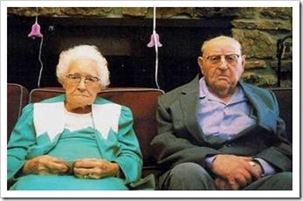 When you read the title “people change”, you might be thinking, “Well, of course they do”, but very often, when you are very close to another person for a long time, these changes are difficult to notice. On the other hand, sometimes it is not the other person who changes, but us, and that just changes the way we see them.
When you read the title “people change”, you might be thinking, “Well, of course they do”, but very often, when you are very close to another person for a long time, these changes are difficult to notice. On the other hand, sometimes it is not the other person who changes, but us, and that just changes the way we see them.
When we start a long-term relationship, we are so intent on making it work that we overlook things we would prefer to be different “as long as we’re happy together”, but the discomfort caused by those overlooked things grows over time to the point where we suddenly notice them. One day, we are surprised to discover for the first time something our partner has been doing or saying for years. All that time, we dismissed it in different ways (“bad mood”, “something at work”, “didn’t really understand”, “only joking”, etc), but now, we look at “this thing” head on and think our partner has changed.
In a strange sort of way, the things that attracted us to that special person in the first place can become annoying over time, until we determine that the person has changed. We also get used to good things (annoying, but natural), which makes us take the good side of any character trait or behavior for granted, while getting more and more upset with the bad side.
For example, you may be with a man whom you thought was very funny, but now he just does not take anything seriously.
Or your woman’s appeal was her incredible intelligence and her ability to participate in any conversation and articulate an opinion on any topic, but now she is a critical know-it-all who always has to have the last say and top every argument you present.
 Your man may have been your “Huggy Bear”, always ready to embrace you and hold you tight, but now he just strangles you and wants to cuddle at the “wrong” times.
Your man may have been your “Huggy Bear”, always ready to embrace you and hold you tight, but now he just strangles you and wants to cuddle at the “wrong” times.
Your woman may have been innocent and pure, without a negative thought about anyone or anything, but now she is just childish, naïve or even blind.
Or your partner may have been a responsible, respectable and well-organized person, worthy of anyone’s admiration, but now he or she is so uptight, so strict and treats you like a parent would treat a child.
So who has changed? You? Them? Life?
On the other hand, some changes can be very dramatic. Major events in life, like losing someone close, a life-threatening situation, a hard illness and even losing your job, can bring about deep and meaningful changes in you, in the other person or in both.
How can you be the same when your confidence in your health has been shattered? How can you stay the same person when you have seen death? How can you stick to the same behaviors when all of the assumptions you used to live by have changed?
Well, you can’t.
Actually, do you react the same to a situation when you are mad as when you are happy? Do you treat people the same when you are tired as when you are refreshed?
Even the same person in the same place on the same day can have vastly different reactions to the same thing (like the phone ringing). How can we expect anyone to stay the same through years of living and going through events big and small?
Well, we can’t.
So what should we do?
Whether we change or not, whether our partner changes or not, life always changes, which is why we must remember one very important thing:
In a relationship, it’s not about who’s right. It’s about what works
 Every relationship should combine a focus on getting the best outcomes (especially in terms of good feelings) and a feedback loop, which allows the partners to adjust the things they do until they work.
Every relationship should combine a focus on getting the best outcomes (especially in terms of good feelings) and a feedback loop, which allows the partners to adjust the things they do until they work.
In a sense, we should treat our partner as a bit of a new person all the time and pay attention to any changes in their responses to familiar things. Any consistent new response means our partner has changed and we must adapt our view of them.
Looking at your partner with new eyes and spotting changes in them can be a refreshing game that keeps your expectations in check. The biggest problem in any relationship is holding on to unrealistic expectations your partner cannot fulfill. Re-evaluating your partner daily and letting go of old expectations means releasing the tension in the relationship and discovering a better person in your partner, someone who fulfills more of your expectations, no matter what the changes are.
As a quick exercise, give this a try:
- Make a list of the behaviors and character traits that have attracted you to your partner
- Make a list of the behaviors and character traits you do not appreciate in your partner at the moment
- Go over the two lists and see if there are any items that appear on both (the may be stated differently, but their essence is the same, like “funny” and “doesn’t take things seriously”). Highlight these items
- Ask yourself if any of the highlighted items migrated from the attraction list to the resentment list due to a change in your own perception. Notice how the realization makes you relax a little bit
- Ask yourself in any of the highlighted items, or any other things you do not appreciate in your partner, are just a result of the life your partner has had. In your mind, see the world through his or her eyes and try to experience what he or she had gone through (pay attention to fear in particular). Would you be different?
- Go back to the attraction list and ask yourself if any of these things are still present in your life, but perhaps you have grown used to them. Does your partner still make you laugh? Is he/she still smart or good with technology? Pretty? Strong?
 I have a feeling that when this exercise is over, you will have a renewed appreciation for your partner as a person, a human being – good, scared, brave, imperfect and loving. If not, take a break and do it again in a few days when you are relaxed and have the time.
I have a feeling that when this exercise is over, you will have a renewed appreciation for your partner as a person, a human being – good, scared, brave, imperfect and loving. If not, take a break and do it again in a few days when you are relaxed and have the time.
Having renewed your attraction, understanding and faith in your partner, resolve to see him or her as a new person every day, to take responsibility for your own perception and to quickly run through the above exercise when you feel your relationship is getting out of whack.
Loving life,
Gal











